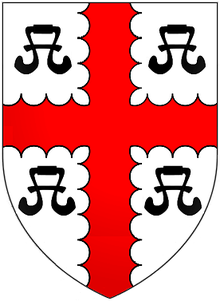Fulk Bourchier, 10th Baron FitzWarin
| Fulk Bourchier, 10 Baron FitzWarin | |
|---|---|

Arms of Bourchier: Argent, a cross engrailed gules between four water bougets sable
|
|
| Spouse(s) | Elizabeth Dynham |
| Issue | |
| Noble family | Bourchier |
| Father | William Bourchier, 9th Baron FitzWarin |
| Mother | Thomasine Hankford |
| Born | 25 October 1445 |
| Died | 18 September 1479 (aged 33) |
Fulk Bourchier, 10th Baron FitzWarin (25 October 1445 – 18 September 1479) was the son and heir of William Bourchier, 9th Baron FitzWarin (1407–1470) and the father of John Bourchier, 1st Earl of Bath. He was feudal baron of Bampton in Devon.
Fulk Bourchier was the eldest son and heir of William Bourchier, 9th Baron FitzWarin (1407–1470) by his wife Thomasine Hankford, a daughter and coheiress of Sir Richard Hankford (c. 1397 – 1431) of Annery, Devon, feudal baron of Bampton.
Fulk Bourchier married Elizabeth Dynham (died 19 October 1516), the daughter of Sir John Dinham (1406–1458) of Nutwell by his wife Joan Arches (died 1497), and sister and coheir of John Dynham, 1st Baron Dynham (died 1501). After the death of Fulk Bourchier, Elizabeth Dynham remarried twice, firstly to Sir John Sapcotes (died 1501) of Elton, Huntingdonshire; a stained glass heraldic escutcheon survives in Bampton church showing the arms of Sapcotes impaling Dinham. After the death of Sapcotes, Elizabeth Dynham remarried secondly to Sir Thomas Brandon (died 27 January 1510) of Duddington, Northamptonshire. There was no issue of Elizabeth Dynham's marriage to Thomas Brandon, and according to Gunn, after his death she took a vow of celibacy before Bishop Fisher on 21 April 1510. She died 19 October 1516, and was buried in the Greyfriars, London.
By Elizabeth Dynham Fulk Bourchier had the following children:
Bourchier died 18 September 1479 at the age of thirty-three. In his will, dated 1 April 1475 and proved 10 November 1480, he requested burial in the chapel of the Blessed Virgin at Bampton, Devon, next to the tomb of his mother, the Lady Thomasine. He left the residue of his estate to his wife, Elizabeth Dynham, whom he made his sole executrix.
...
Wikipedia
